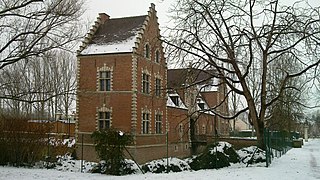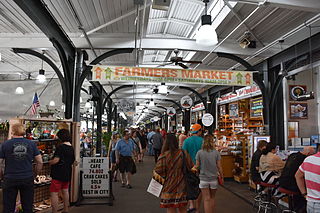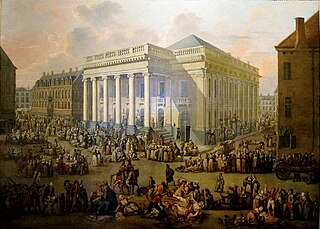
Bastille Day is the common name given in English-speaking countries to the national day of France, which is celebrated on 14 July each year. In French, it is formally called the Fête nationale française ; legally it is known as le 14 juillet.

The Hague is the capital city of the South Holland province of the Netherlands. With a population of over half a million, it is the third-largest city in the Netherlands. Situated on the west coast facing the North Sea, The Hague is the country's administrative centre and its seat of government, and while the official capital of the Netherlands is Amsterdam, The Hague has been described as the country's de facto capital since the time of the Dutch Republic.

Lille is a city in the northern part of France, within French Flanders. Positioned along the Deûle river, near France's border with Belgium, it is the capital of the Hauts-de-France region, the prefecture of the Nord department, and the main city of the European Metropolis of Lille.

Tielt is a Belgian city and municipality in the province of West Flanders. The municipality comprises the town of Tielt proper and the villages of Aarsele, Kanegem, and Schuiferskapelle.

Mouscron is a city and municipality of Wallonia located in the Belgian province of Hainaut, along the border with the French city of Tourcoing, which is part of the Lille metropolitan area.

Pays de la Loire is one of the eighteen regions of France, located on the country's Atlantic coast. It was created in the 1950s to serve as a zone of influence for its capital and most populated city, Nantes, one of a handful of French "balancing metropolises". In 2020, Pays de la Loire had a population of 3,832,120.

A flea market is a type of street market that provides space for vendors to sell previously owned (second-hand) goods. This type of market is often seasonal. However, in recent years there has been the development of 'formal' and 'casual' markets which divides a fixed-style market (formal) with long-term leases and a seasonal-style market with short-term leases. Consistently, there tends to be an emphasis on sustainable consumption whereby items such as used goods, collectibles, antiques and vintage clothing can be purchased, in an effort to combat climate change and fast fashion.

Villeneuve-d'Ascq is a commune in the Nord department in northern France. With more than 60,000 inhabitants and 50,000 students, it is one of the main cities of the Métropole Européenne de Lille and the largest in area (27.46 km2) after Lille. It is also one of the main cities of the Hauts-de-France region.

A Christmas market is a street market associated with the celebration of Christmas during the four weeks of Advent. These markets originated in Germany, but are now held in many countries. Some in the U.S. have adapted the name to the quasi-German Christkindlmarket, substituting market for German Markt.

The French Market is a market and series of commercial buildings spanning six blocks in the French Quarter of New Orleans, Louisiana. Founded as a Native American trading post predating European colonization, the market is the oldest of its kind in the United States. It began where Café du Monde currently stands and has been rebuilt and renovated a number of times.

Saint-Maixent-l'École is a commune in the department of Deux-Sèvres, region of New Aquitaine, western France.

A marketplace, market place or just market is a location where people regularly gather for the purchase and sale of provisions, livestock, and other goods. In different parts of the world, a marketplace may be described as a souk, bazaar, a fixed mercado (Spanish), or itinerant tianguis (Mexico), or palengke (Philippines). Some markets operate daily and are said to be permanent markets while others are held once a week or on less frequent specified days such as festival days and are said to be periodic markets. The form that a market adopts depends on its locality's population, culture, ambient and geographic conditions. The term market covers many types of trading, as market squares, market halls and food halls, and their different varieties. Thus marketplaces can be both outdoors and indoors, and in the modern world, online marketplaces.

Geispolsheim is a commune in the Bas-Rhin department in Grand Est in north-eastern France.

Kortrijk, sometimes known in English as Courtrai or Courtray, is a Belgian city and municipality in the Flemish province of West Flanders.

Moules-frites or moules et frites is a main dish of mussels and French fries originating in Northern France and Belgium. The title of the dish is French, moules meaning mussels and frites fries, with the Dutch name for the dish meaning the same. It is considered the national dish of Belgium.

The Lille Métropole Half Marathon is an annual half marathon foot race which takes place in Lille, France, in early September. First organised by the Association de Promotion des Événements Lillois in 1986, the race began as a marathon event before switching to the shorter distance in 1996. The course of the race begins in the Boulevard de la Liberté and finishes at the front of Lille's city hall on Rue de Paris.
The Greek mafia is the colloquial term used to refer to various organized crime elements originating from Greece. Indigenous organized criminal groups are well-entrenched in the largest Greek urban centers, particularly in Athens.

The Lille Braderie is a braderie, or annual street market/flea market, that takes place on the weekend of the first Sunday of September in Lille, France, in the northern Hauts-de-France region. It dates back to the 12th century, attracting nearly three million visitors each year. The Braderie de Lille is one of the largest gatherings in France and the largest flea market in Europe. In 2014 the Braderie was reported to host 100km of market stalls to over 10,000 exhibitors.

The Montsoreau Flea Market is the largest flea market in the Loire Valley, taking place all year the second Sunday of the month. Montsoreau is a small city named after the mount Soreau on which is built the famous château de Montsoreau, the only château of the Loire Valley to have been built in the Loire riverbed. Montsoreau is listed among the most beautiful villages of France, and both the village and the château are part of the UNESCO listed World Heritage Site of the Loire valley. The Montsoreau Flea Market includes all year, a hundred professional merchants and is located in the vieux port district, on the banks of the Loire river.

Place du Général-de-Gaulle is an urban public space situated in the commune of Lille, Hauts-de-France region. It is the town's historic main square. It has a grand-place style, which is typical of many cities in the former Netherlands.


















